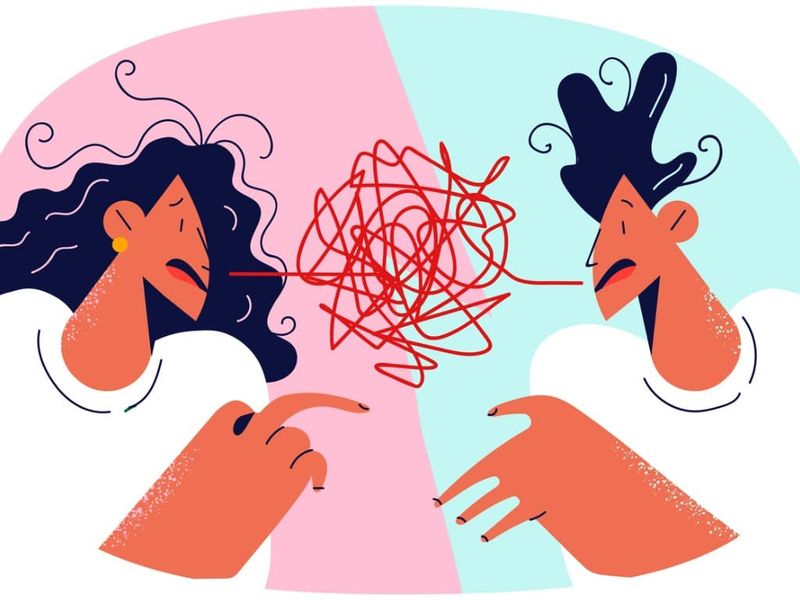15 Thought Patterns That Drew People Into Toxic Love And 5 Big Mistakes That Trapped Them There
We don’t fall into toxic relationships because we’re foolish. We fall because we’re human. Because we believe in love. Because we mistake emotional chaos for passion, or caretaking for connection. And sometimes, the thoughts that pull us in… feel a lot like hope.
This is for everyone who’s ever wondered why smart, caring women end up in the messiest of love stories—and why leaving feels harder than calculus. Let’s get real about the mind tricks and emotional potholes that turn romance into a rollercoaster.
1. The Heroine Complex: “I Can Fix Them.”

Saving someone sounds noble until you’re exhausted from carrying their baggage. Somewhere along the way, caring slips into caretaking, and before you know it, you’ve become their personal emotional mechanic.
We tell ourselves that if we just love a little harder, show a little more patience, everything will magically right itself. Spoiler: it rarely works out that way. Trying to heal someone else often ends with us feeling even more broken.
Sometimes wanting to be the fixer is just a distraction from fixing our own empty spaces. The truth? You are not a rehab facility. You’re a person who deserves peace, not a never-ending project. There’s nothing romantic about losing yourself to save someone else’s soul.
2. Adrenaline Is Not Affection: “This Is What Love Is Supposed to Feel Like.”

If your heart pounds like you’re on a reality TV show every time you’re around them, that might not be love—it’s anxiety in a cute outfit. Love that feels like a rollercoaster can seem exciting, but it’s often your nervous system waving a red flag.
When chaos and control are familiar, calmness can feel boring or even wrong. We start believing drama is the mark of true love, and we crave the rush, even when it hurts.
Healthy romance doesn’t fry your nerves. The real magic is in safe, steady affection—the kind that soothes, not spikes. It’s okay to want peace instead of drama. Boring can actually be beautiful.
3. Blame Game Blues: “Maybe I’m the Problem.”

Ever felt like you were auditioning for the role of “biggest screw-up” in your own relationship? Toxic love turns self-doubt into an Olympic sport. The second you start over-apologizing, their control tightens.
You might catch yourself replaying every argument, wondering if you’re to blame for their moods or outbursts. When you’re constantly walking on eggshells, it’s easy to lose perspective.
Gaslighting thrives here—it convinces you that their bad behavior is all your fault. But here’s the truth: healthy love doesn’t make you question your worth. You don’t have to shrink just to keep someone else comfortable.
4. The Bare Minimum Bar: “At Least They’re Not Cheating/Hitting Me/etc.”

It’s wild how quickly we can lower our standards when we’re craving connection. “At least they’re not cheating” shouldn’t be the highlight of a love story. Yet, when emotional abuse is low-key, we convince ourselves it’s not that bad.
Red flags get muted, swept under the rug, or explained away as quirks. Meanwhile, invisible cuts—like manipulation or gaslighting—go untreated because they don’t leave bruises.
Settling becomes the routine, and the bar for happiness is practically buried underground. You deserve more than just the absence of obvious harm. Love should feel like growth, not just survival.
5. The Mask Slips: “But They Weren’t Always Like This.”

Looking back, you remember all the sweet beginnings—the effort, the laughter, the little gestures. But here’s the twist: the new, cruel side wasn’t new at all. It was just hidden.
Toxic people are masters of disguise. When the mask finally slips, we want to believe it’s a phase or stress, not their real face.
This hope traps us in the cycle, waiting for the “good” version to return. But the ugly side was always part of the package. It’s not your fault for missing the clues—love wants to see the best, not the worst.
6. Bonded By Battle: “We’ve Been Through So Much Together.”

Shared history can feel like a thick, unbreakable rope tying you together. When you’ve survived chaos as a team, it creates a sense of loyalty—even if the “team” is just surviving drama.
But trauma-bonding isn’t romance. It’s like being stuck in a foxhole with someone: you mistake shared struggle for true love.
The weight of “everything we’ve survived!” keeps many stuck, believing leaving erases the meaning of those hard years. Real love doesn’t demand you keep re-living your worst days. You’re allowed to want peace, not just shared scars.
7. Needed, Not Loved: “They Need Me.”

You might tell yourself it’s love, but deep down, it’s obligation. You’re the glue holding everything—and everyone—together, but who’s holding you?
People in toxic love often become emotional caretakers. You get so wrapped up in their needs, you forget your own. “They need me” starts to sound like “I’m lucky anyone needs me at all.”
Here’s the truth: being needed isn’t the same as being cherished. You deserve to be chosen, not just depended on. Your worth isn’t measured by how much you fix, but how deeply you’re valued.
8. No One Gets Them Like Me: “No One Else Would Understand Them Like I Do.”

Ever felt like you’re holding the world’s most complicated secret? Toxic partners love convincing you that you’re the only person who “gets” them.
This creates a weird, lonely loyalty. Suddenly, you’re the gatekeeper to their hidden pain, their misunderstood genius, their upside-down heart.
But being someone’s emotional translator isn’t romantic. It just isolates you, cuts you off from support, and keeps you hooked longer than you should be. You’re not the chosen one—you’re just trapped by exclusivity.
9. Excuse Parade: “It’s Just Their Trauma Talking.”

Of course trauma matters—it shapes us. But there’s a difference between understanding someone’s wounds and letting them weaponize their pain.
Toxic love makes endless excuses. You whisper, “it’s just their trauma,” every time they lash out, as if your compassion can cure them by osmosis.
You can love someone and still expect basic decency. Their pain isn’t a hall pass for cruelty. Compassion shouldn’t cost you your own well-being.
10. Sorry, Not Sorry: “They Say They’re Sorry… That Means Something, Right?”

Apologies are nice—when they’re real. In toxic love, “sorry” is often just a reset button, not a signal for actual change.
You find yourself clinging to every little crumb of remorse, hoping it’ll turn into a feast of better behavior. Over time, the words lose their meaning.
Without actions to back them up, apologies are empty calories—emotionally filling for a moment, but never satisfying. You deserve real change, not recycled promises.
11. Chemistry Over Safety: “We Have So Much Chemistry.”

Sometimes sparks are just warning flares in disguise. That crazy “chemistry” can feel intoxicating, but it doesn’t always mean you’re right for each other.
Attraction is powerful, but it shouldn’t be confused with compatibility or emotional safety. The hottest fires can burn you the fastest.
What really matters is how you feel after the sparks cool. Does this person make you feel safe, or just addicted to the drama? You deserve a relationship that doesn’t leave you scorched.
12. Rough Patch Excuses: “They’re Just Going Through a Rough Time.”

We all hit rough patches, but in toxic love, every day feels like a storm. You find yourself explaining away their cruelty as stress, work, or “just a bad phase.”
Empathy is wonderful, but it’s not a permission slip for disrespect. If the rough patch never ends, maybe it’s not a patch—it’s the whole quilt.
Loyalty doesn’t mean tolerating endless pain. It’s okay to want consistency, not just survival on the emotional battlefield. You’re allowed to ask: “What about my rough days?”
13. Human, Not a Punching Bag: “I’m Not Perfect Either.”

We all have flaws, but toxic partners will twist your mistakes into weapons. You start believing that because you’re not perfect, you deserve the cold shoulder, the silent treatment, or worse.
This false equivalency keeps you stuck, apologizing for being human while they get away with being cruel. It’s emotional sleight of hand.
Remember: healthy relationships are about compassion for both people. You are allowed to be imperfect without being punished for it. Don’t let anyone use your humanity against you.
14. The Struggle Myth: “Relationships Are Supposed to Be Hard.”

There’s this myth that love is only real if it’s “hard-earned.” But when the struggle becomes your whole story, something’s gone sideways.
Cry-fests, fights, and constant compromise aren’t the foundation of a healthy partnership. If you’re losing yourself to make it work, that’s not love—it’s survival mode.
Genuine connection feels like coming home, not like running a marathon with a sprained ankle. You’re allowed to want ease and joy, not just endurance. Repeat after me: love shouldn’t hurt this much.
15. The Love Alchemist: “If I Love Them Enough, They’ll Change.”

We want to believe that love is magical enough to melt away someone’s pain or fix their flaws. But pouring yourself out doesn’t always fill another’s cup.
Toxic love teaches you that if you just love harder, they’ll finally become the partner you need. That hope keeps you hanging on long past the breaking point.
Truth bomb? People only change if they want to, not because you sacrificed yourself for them. You’re not a wizard. You’re worthy of love that doesn’t require endless patience and self-erosion.
16. Shame in Silence: Staying Silent Out of Shame

Shame keeps secrets locked tight. Admitting you’re in a toxic relationship feels like broadcasting your deepest failure—even though it’s not your fault.
So you pull away from friends, hide the truth, and let isolation take over. Silence becomes your comfort zone, but also your prison.
Breaking the silence is scary, but it’s the first step toward freedom. You don’t owe anyone perfection, just honesty with yourself. Don’t let shame decide your story’s ending.
17. Highlight Reel Trap: Romanticizing the Good Days

It’s easy to scroll through memories of the good times, convincing yourself they outweigh the bad. Toxic love turns a handful of happy moments into a highlight reel that distracts from reality.
Clinging to the highs keeps you stuck in the lows. You wait for another glimpse of the person you fell for, hoping those sweet days will return for good.
But a few golden hours can’t erase months of heartache. Real love doesn’t make you beg for breadcrumbs. Don’t let nostalgia write checks your heart can’t cash.
18. Intensity Isn’t Intimacy: Confusing Intensity with Intimacy

Some relationships feel like you’re living in a soap opera—tears, fights, passionate makeups. It seems deep, but it’s really just emotional whiplash.
We confuse intensity for closeness, but real intimacy is about feeling safe, understood, and—dare I say—calm. Rollercoaster emotions might make for great stories, but they’re exhausting to live through.
You deserve a relationship that offers clarity, not confusion. Intensity fades, but real connection grows. Don’t settle for drama when you could have genuine comfort.
19. Time Won’t Fix It: Thinking Time Equals Truth

We trick ourselves into believing that the longer we stay, the truer the love must be. Years invested become proof, even if those years were mostly pain.
But clocking overtime in dysfunction doesn’t magically turn it into destiny. Time is a teacher, not a validator.
Leaving is hard when you’ve poured so much in, but real love isn’t measured in months or milestones. You’re allowed to choose yourself—even if it means starting over with an empty calendar.
20. The Closure Myth: Waiting for Closure From the Person Who Broke You

We all want that final conversation, the tidy explanation, the apology that finally makes it all make sense. Toxic love dangles closure like a carrot.
But the person who broke you rarely delivers the healing you crave. You end up waiting for words that never come, stuck in a holding pattern of hurt.
Real closure isn’t something they give—it’s something you claim for yourself, by walking away. Your healing doesn’t need their permission. Stop waiting at the station for a train they’ll never send.







